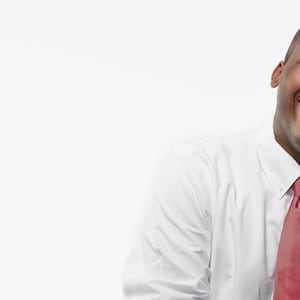Michael Tubbs was having a bad week. Terrible, really. While still a senior at Stanford University, he had decided to run for city council in his hometown of Stockton after his cousin was fatally shot there.
Tubbs enjoyed campaigning and talking to people, many of whom had never had someone knock on their door and ask for their vote before, but he hated fundraising and asking those without much money to donate to his campaign. Recently, no one had showed up for a weekly precinct walk—not even his campaign manager—and he could barely afford the gas to drive the 85 miles between Palo Alto and Stockton.
Discouraged and thinking of quitting the race, Tubbs opened an envelope that he thought would contain another bill he couldn’t pay. Instead, he found a $10,000 check from Oprah Winfrey, whom he’d met at a Stanford event a few weeks prior.
ADVERTISEMENT
Tubbs has had a lifetime of extremes—winning that election, growing up poor, interning in Barack Obama’s White House, getting pulled over for a DUI, becoming Stockton’s mayor in 2016 at 26, getting national attention for his universal basic income program, and losing his bid for reelection, in large part due to a website that pushed disinformation, including the lie that Tubbs was being investigated by the FBI. Getting that check from Winfrey when he was close to dropping out of the race stood out as an extreme moment.
“I was exhausted, and no one was showing up to help me, and I was missing my girlfriend,” Tubbs said. “When that check came it was the ultimate validation and the ultimate reminder. I was ready to quit, and at that moment it was like, ‘Shut up, trust the process.’ When I was mayor, even when I lost reelection, I’ve never been as down as I was on that day, and that day really served as a reminder.”
Tubbs tells this story in his new book, The Deeper the Roots: A Memoir of Hope and Home, which recounts his life growing up with a mother who gave birth to him as a teenager and kept getting passed over for promotions because she didn’t have a college degree, and a father who was in prison for most of Tubbs’ life. In the book, Tubbs briefly sketches out some of Stockton’s history—a town in California’s Central Valley, where both sets of his grandparents had moved to seeking opportunity. In the 1980s, after gangs moved in for the crack cocaine business and wealthier residents left for the suburbs, the city of 310,000 ended up on lists of the worst cities of its size.
In his book, Tubbs also writes about his anger, a lot of which was directed at teachers and led him to file a successful NAACP complaint against a high-school science teacher who had what he called a “Retard Helmet” that he forced students to wear if they asked what he considered a dumb question, and who told Tubbs’ classmates that he was playing the “Black card” to get scholarships.
Tubbs says a lot of that fury came from growing up in poverty, and from the racism he saw around him.
“I mean, being born Black and poor with a father in jail, it seems like you should be angry,” he said. “My earliest report card said I had anger problems. I think it was a fury at everything that was broken that didn’t seem right or fair or just and dealing with racist teachers or dealing with low expectations or dealing with limited resources.”
Reading the book, you see Tubbs’ desire to bring not just himself, but others, out of poverty, and he wanted to learn about causes and solutions to economic distress. During spring break of his sophomore year, instead of hitting the beaches of Cancun, he went to El Salvador with a group commemorating the 30th anniversary of the assassination of Archbishop Oscar Romero—whom Tubbs saw as being like his hero, Martin Luther King Jr., fighting for the poor and for human rights. The following year, after studying the country’s transition from apartheid rule to free elections that brought Nelson Mandela to power, Tubbs spent several months in South Africa. While in Capetown, he did community service at a shelter for young men who were former street children.
Before Andrew Yang made it his presidential platform, Tubbs implemented a guaranteed basic income program in Stockton, giving $500 to 125 people for 18 months. One study found that most participants spent the money on basic necessities like food, clothing, and utilities—and their financial security, well-being, and job prospects improved.
Tubbs grew up not just with the support of his mother, whom he calls “she-daddy,” but also his aunt, who loved taking him to the library, and grandmother, a case manager for people on welfare, and he writes about being “imprisoned in their love.” When he was a teenager, he and his mother often argued often about him skipping household chores to study, and sometimes she would throw him out of the house (he’d go stay with his aunt), but he remained confident of her support and devotion.
Tubbs and his wife and two children now live in Los Angeles. He is chairman of Mayors for Guaranteed Income, spearheading the initiative End Poverty in California, and an unpaid special adviser for economic mobility and opportunity for Governor Gavin Newsom.
One of the reasons for the move to L.A. was he sees it as the capital of stories, and that’s the way to make change, Tubbs thinks.
“Stories are how we make meaning and how we relate to each other,” Tubbs said. “As a Christian, I realize Jesus didn’t give sermons—he told stories. That’s how we learn.”
Tubbs says he’s proud of many things he did as mayor, such as creating a foundation that administers college scholarships and a program to reduce gun violence. But one of the biggest satisfactions he has from his time in office is changing the way people looked at the city, which, before he became mayor, was known as the foreclosure capital of the country and the biggest American city to go bankrupt in 2012.
“Growing up, Stockton was always on the worst lists. No one was looking at Stockton for anything good, and in Stockton young, Black men were looked at as the worst,” he said. “To be the first Black mayor and to be responsible for helping change the city’s image from a place of deficit to a place where people are looking for solutions and hope—I’ll be proud of that for the rest of my life.”







